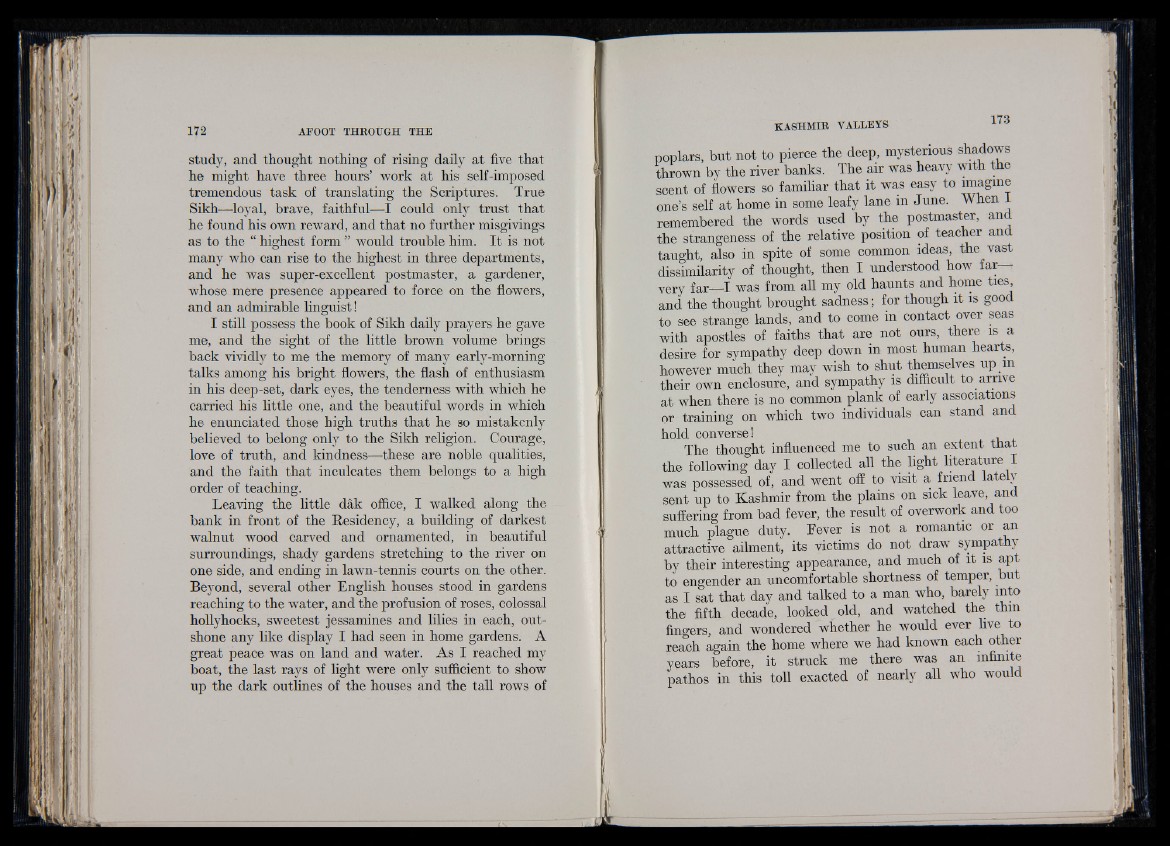
study, and thought nothing of rising daily at five that
he might have three hours’ work at his self-imposed
tremendous task of translating the Scriptures. True
Sikh—loyal, brave, faithful—I could only trust that
he found his own reward, and that no further misgivings
as to the “ highest form ” would trouble him. I t is not
many who can rise to the highest in three departments,
and he was super-excellent postmaster, a gardener,
whose mere presence appeared to force on the flowers,
and an admirable linguist!
I still possess the book of Sikh daily prayers he gave
me, and the sight of the little brown volume brings
back vividly to me the memory of many early-morning
talks among his bright flowers, the flash of enthusiasm
in his deep-set, dark eyes, the tenderness with which he
carried his little one, and the beautiful words in which
he enunciated those high truths that he so mistakenly
believed to belong only to the Sikh religion. Courage,
love of truth, and kindness—these are noble qualities,
and the faith that inculcates them belongs to a high
order of teaching.
Leaving the little dak office, I walked along the
bank in front of the Residency, a building of darkest
walnut wood carved and ornamented, in beautiful
surroundings, shady gardens stretching to the river on
one side, and ending in lawn-tennis courts on the other.
Beyond, several other English houses stood in gardens
reaching to the water, and the profusion of roses, colossal
hollyhocks, sweetest jessamines and lilies in each, outshone
any like display I had seen in home gardens. A
great peace was on land and water. As I reached my
boat, the last rays of light were only sufficient to show
up the dark outlines of the houses and the tall rows of
poplars, but not to pierce the deep, mysterious shadows
thrown by the river banks. The air was heavy with the
scent of flowers so familiar that it was easy to imagine
one’s self at home in some leafy lane m June. When 1
remembered the words used by the postmaster, and
the strangeness of the relative position of teacher an
taught, also in spite of some common ideas, the vast
dissimilarity of thought, then I understood how f a r -
very far—I was from all my old haunts and home ties,
and the thought brought sadness; for though it is good
to see strange lands, and to come in contact over seas
with apostles of faiths that are not ours, there is a
desire for sympathy deep down in most human hearts,
however much they may wish to shut themselves up m
their own enclosure, and sympathy is difficult to arrive
at when there is no common plank of early associations
or training on which two individuals can stand and
hold converse!
The thought influenced me to such an extent that
the following day I collected all the light literature I
was possessed of, and went off to visit a friend lately
sent up to Kashmir from the plains on sick leave, and
suffering from bad fever, the result of overwork and too
much plague duty. Eever is not a romantic or an
attractive ailment, its victims do not draw sympathy
by their interesting appearance, and much of it is apt
to engender an uncomfortable shortness of temper, but
as I sat that day and talked to a man who, barely into
the fifth decade, looked old, and watched the thin
fingers, and wondered whether he would ever five to
reach again the home where we had known each other
years before, it struck me there was an infinite
pathos in this toll exacted of nearly all who would